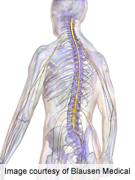- Could Your Grocery Store Meat Be Causing Recurring UTIs?
- Are You Making This Expensive Thermostat Error This Winter?
- Recognizing the Signs of Hypothyroidism
- 10 Strategies to Overcome Insomnia
- Could Artificial Sweeteners Be Aging the Brain Faster?
- Techniques for Soothing Your Nervous System
- Does the Water in Your House Smell Funny? Here’s Why
- Can a Daily Dose of Apple Cider Vinegar Actually Aid Weight Loss?
- 6 Health Beverages That Can Actually Spike Your Blood Sugar
- Treatment Options for Social Anxiety Disorder
Early Study Says Stem Cells May Reverse Multiple Sclerosis Disability


A therapy that uses patients’ own primitive blood cells may be able to reverse some of the effects of multiple sclerosis, a preliminary study suggests.
The findings, published Tuesday in the Journal of the American Medical Association, had experts cautiously optimistic.
But they also stressed that the study was small — with around 150 patients — and the benefits were limited to people who were in the earlier courses of multiple sclerosis (MS).
“This is certainly a positive development,” said Bruce Bebo, the executive vice president of research for the National Multiple Sclerosis Society.
There are numerous so-called “disease-modifying” drugs available to treat MS — a disease in which the immune system mistakenly attacks the protective sheath (called myelin) around fibers in the brain and spine, according to the society. Depending on where the damage is, symptoms include muscle weakness, numbness, vision problems and difficulty with balance and coordination.
But while those drugs can slow the progression of MS, they can’t reverse disability, said Dr. Richard Burt, the lead researcher on the new study and chief of immunotherapy and autoimmune diseases at Northwestern University’s Feinberg School of Medicine in Chicago.
His team tested a new approach: essentially, “rebooting” the immune system with patients’ own blood-forming stem cells — primitive cells that mature into immune-system fighters.
The researchers removed and stored stem cells from MS patients’ blood, then used relatively low-dose chemotherapy drugs to — as Burt described it — “turn down” the patients’ immune-system activity.
From there, the stem cells were infused back into patients’ blood.
Just over 80 people were followed for two years after they had the procedure, according to the study. Half saw their score on a standard MS disability scale fall by one point or more, according to Burt’s team. Of 36 patients who were followed for four years, nearly two-thirds saw that much of an improvement.
Bebo said a one-point change on that scale — called the Expanded Disability Status Scale — is meaningful. “It would definitely improve patients’ quality of life,” he noted.
What’s more, of the patients followed for four years, 80 percent remained free of a symptom flare-up.
There are caveats, though. One is that the therapy was only effective for patients with relapsing-remitting MS — where symptoms flare up, then improve or disappear for a period of time. It was not helpful for the 27 patients with secondary-progressive MS, or those who’d had any form of MS for more than 10 years. Secondary-progressive MS occurs when the disease progresses more steadily and people no longer go through waves of symptoms and recovery.
Between 250,000 and 350,000 Americans have MS, according to the National Institutes of Health (NIH). Most are initially diagnosed with the relapsing-remitting form. Eventually, relapsing-remitting MS transitions to the secondary-progressive form.
It makes sense that stem cell therapy would be effective only in the relapsing-remitting stage, according to Bebo. That’s the phase where the immune system is actively attacking the myelin.
Burt agreed, noting that once people are in the secondary-progressive stage, the damage to nerves is done.
A big question is what will the long-range effects will be, according to an editorial published with the study.
MS usually arises between the ages of 20 and 40, according to the NIH. Since disabilities can take decades to develop, the ultimate benefits — and risks — of stem cell therapy remain unknown, writes Dr. Stephen Hauser, a neurologist at the University of California, San Francisco.
It’s also unclear, Hauser writes, whether the therapy is really “resetting” the immune system.
Bebo agreed. “In this report,” he said, “there’s no data to show whether that’s happening.”
What’s needed now, Bebo said, are controlled trials where patients are randomly assigned to receive stem cell therapy.
Burt agreed, and said that’s what his team is doing: A clinical trial is underway at several medical centers, looking at patients with relapsing-remitting MS whose symptoms have failed to improve after at least six months on standard medications. They’re being randomly assigned to either stem cell therapy or further drug therapy.
If stem cell therapy does prove effective, it’s hard to say exactly how it will fit in with standard MS care, according to Bebo.
On one hand, the regimen is fairly intensive and expensive. “But in theory,” Bebo said, “it would only have to be done once, and never again.”
The disease-modifying drugs for MS — such as beta interferons (Avonex, Refib, Betaseron), glatirimer (Copaxone) and natalizumab (Tysabri) — can cost thousands per month, according to the background information in the study.
Comparatively, stem cell therapy, at around $125,000, could prove very cost-effective, according to Burt.
For now, stem cell therapy is available only in clinical trials, or on a “compassionate use” basis for some patients who don’t qualify for a trial, Burt said.
If it’s eventually approved as an MS therapy, Burt said he foresees stem cells as a “second-line” therapy for patients who do not fare well on a disease-modifying drug.
More information
The National Multiple Sclerosis Society has more on stem cells and multiple sclerosis.
Source: HealthDay
Copyright © 2026 HealthDay. All rights reserved.










